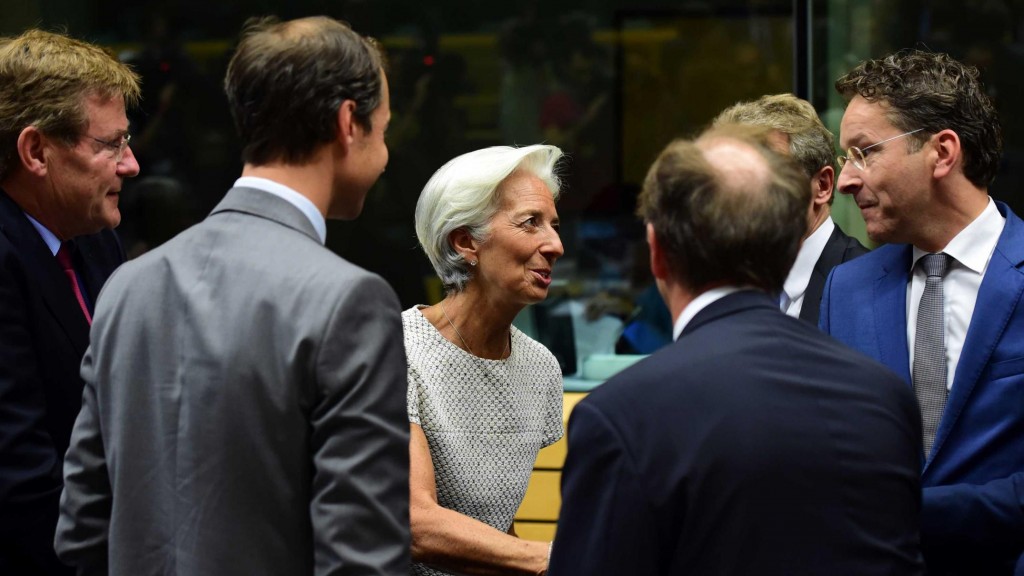The finance ministers of euro zone said they were unlikely to finalize a deal on the framework of a third Greek bailout, cutting off Greece from the badly needed cash boost.
Germany led group within the euro zone countries are staunchly resist to offer another bailout to Greece, but luckily the worst-case scenario became out-of-date. The meeting of the 28 European Union leaders was called off this Sunday. Because the scenario to kick Greece out from the euro zone require unanimity from the EU leaders, the cancellation of the meeting today indicates zero appetite from the members to accept the scenario. The summit of the 19 euro-area leaders was still underway, meaning they’ll vote whether to begin negotiations on assistance.
“If this was a negotiation from one to 10, I think we’re still standing somewhere between three and four,” commented the Finnish Finance Minister Alexander Stubb, who opposes any kind of bailout, before the Sunday gathering. “We’re very far away” from a settlement.
The creditors are displeased with the commitments the Greek government has made towards the resolution, saying the Greek government can’t be trusted and demanding Athens to pass tax hike and spending cuts into law afore the summit on a bailout package goes ahead.
“If the Greek government commits to implement and vote now — without delay — strong reforms in the short term, there is the basis of negotiations,” explained the euro zone standpoint Pierre Moscovici EU Economic Affairs Commissioner.
Greece Is Running Low on Cash
Mr. Tsipras is in urgent need to make a deal with the leaders otherwise Greece could face harsher economic circumstances. The bank withdrawals are already limited to 60 euros per day, pensions payments are stalled and the commerce activity is likely to deteriorate. The Greek lenders since the last week vote on Sunday are unable to access the European Central Bank emergency exit line.
The current deadlock came after Alexis Tsipras won decisive support in the Greek Parliament for a package of tax hike, pension savings and other fiscal adjustments aimed to secure 74 billion euros. The proposal doesn’t represent the actual economic situation in Greece since the debt talks failed and capital restrictions are introduced two weeks ago, explained the reason of impasse Jeroen Dijsselbloem, the head of the Eurogroup.
The intensifying political and economic situation in Greece mean “it’s not possible to reach a deal today,” commented Slovakia’s Peter Kazimir.
Way In Way Out
Germany’s latest idea to ‘grant’ five years suspension from the currency bloc to Greece became mainstream among German decision makers and media in the past 24 hours.
While the idea was rejected by a European Union official, German Vice Chancellor Sigmar Gabriel greeted it and said “conceivable,” though “this proposal would only be achievable if the Greek government itself views it as the better alternative.”
This new German proposal raised the tensions among euro partners.
“Now that Tsipras has made proposals substantially in line with the European requests, an agreement absolutely has to be reached,” argued Italian Prime Minister Matteo Renzi in Messagero newspaper on Sunday. “You can’t humiliate a European partner.”
Basis for Discussion
To provide basis for discussion has became even more difficult since Greece failed a payment to the International Monetary Fund on June 30 and let its second bailout package to expire the same day.
A new rescue package would be Greece’s third in five years. Meanwhile, the Greek GDP has decreased by about a quarter, increasing its debt burden even higher compared to the GDP than it was in 2010. The new aid would be mainly used to repay the previous loans.
“We were told that Greek debt was at 125 percent but we are now being told that this debt has spiraled to 200 percent and that is alarming, raising even more questions about its sustainability and a solution,” raised his concern the Maltese Finance Minister Edward Scicluna.
The Greek bond market soared on Friday on the good news Tsipras’s fiscal adjustments would cut the way to agreement, the debt issued by Greece’s fourth largest lender lingered under 40 cents on the euro, according to investing.com.
The prices indicate investors forecast debt restructuring from banks after the Greek economic drama triggered depositors to withdraw around 40 billion euros between December and June.
Despite the IMF assurance to support the debt relief proposed by the Greek government, the finance ministers of the common currency zone has rejected.
Troika’s Opinion
The IMF, the European Commission and the European Central Bank previously welcomed the Greek proposal as solid starting point for the bailout, according to a anonymous euro zone bureaucrat.
Tsipras has found political enemies with his latest move not just in Berlin and Brussels but within Syriza too. Dozen
members of his own party rejected to vote for the program, in light of the last Sunday poll where more than 60% of the voters said ‘Oxi’ (No) to the creditor’s rescue package for austerity measures. Mr. Tsipras said after the referendum that his main target is to secure a better bailout deal.
“It could have been better,” commented Spain’s Luis de Guindos as he departed Saturday’s talks. “But it could have been worse.”



